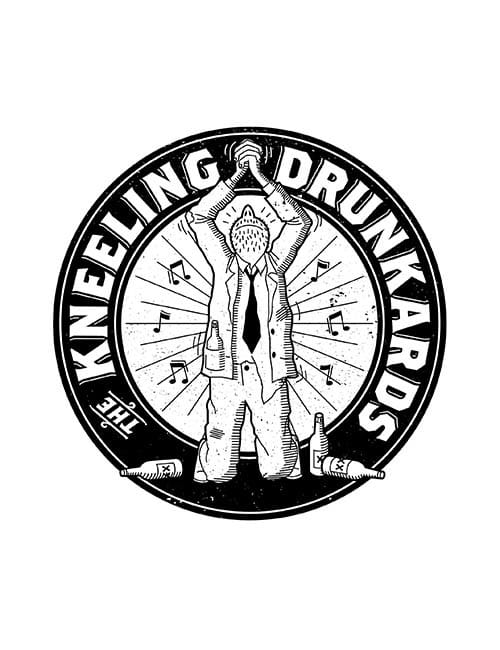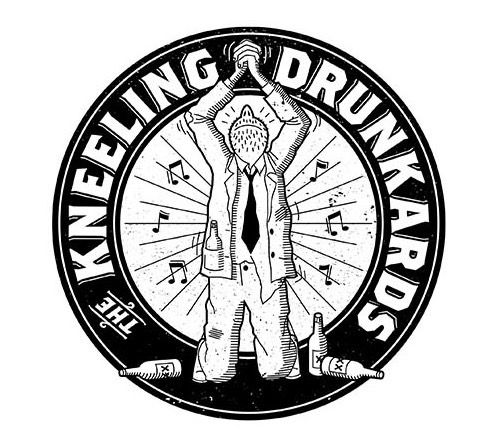Check Out The Country Gospel Style Of The Kneeling Drunkards At Bar Chord This Friday


What’s in a name? In the case of one particular Brooklyn-based five-piece band, just about everything you need to know. Anticipating the first performance by The Kneeling Drunkards at Bar Chord on Friday, January 15, we talked to singer/guitarist Jeff Jones about what the group’s distinctive moniker reveals about them.
DPC: The Kneeling Drunkards is certainly an evocative name for a group, especially one that plies their trade in neighborhood bars. Where did it come from?
Jeff Jones: We started out as country gospel cover band with the plan of playing Sunday brunches around town. We needed a band name that said “country gospel” but also “not religious.” We were covering a handful of Louvin Brothers songs at the time, and knew their version of “The Kneeling Drunkard’s Plea” and loved it, so we borrowed part of the title.
People might be most familiar with “The Kneeling Drunkard’s Plea” from Johnny Cash’s recording, (backed by Tom Petty and the Heartbreakers) on his 1996 Unchained album. Given the musicians involved, it’s not surprising that it’s a rollicking, uptempo version with kind of a “son of rockabilly” feel to it. How much rock is there in the country music you guys play?
We are a five-piece band, and with that comes a lot of different tastes and influences. When we started with the gospel covers we kept it pretty folky and country, but since we started writing our own tunes rock has been sneaking in more and more. One of our new songs called “Roost” is probably to most rock n roll of the bunch.
The “churchy” organ at the beginning of Cash’s recording is a direct quote from the version of the song on The Louvin Brothers “Satan is Real” LP. Ira and Charlie Louvin helped popularize the use of vocal close harmony in country music, with the brothers sometimes switching lead parts and high and low lines within the same song. Has that kind of close harmony influenced The Kneeling Drunkards?
First of all, we all love the “Satan is Real” record (and the cover art especially). We’ve played a bunch of Louvin Brothers tunes in our time (favorites include “Atomic Power” and “The Family Who Prays”) and their vocal style is definitely an influence. Our singer, Angela Nahigian is an amazing harmonizer and helps the rest of us find our parts. I don’t think we have a song without at least two singers on it, and frequently up to four.
You don’t hear it so much in “The Kneeling Drunkard’s Plea”, but elder brother Ira Louvin (in addition to being “notorious for his drinking, womanizing, and volcanic temper”) was celebrated for his work on mandolin, heavily influenced by Bill Monroe. How has the bluegrass tradition shaped your group?
Our pedal steel player, Jarrod Taylor, also plays banjo. He and I started out just playing guitar and banjo on a bunch of old tunes including some classic bluegrass (always some bluegrass nearby if you have a banjo). Once we got the gospel band going the bluegrass sound came in on some songs, most notably our version of “I’ll Flyaway.”
“The Kneeling Drunkard’s Plea” has another connection to Johnny Cash and a direct link to what’s called old-time music or Americana through the Carter Sisters, the second generation of the Carter Family (formed by Maybelle Carter and her daughters Helen Carter, Anita Carter, and June Carter Cash). I’ve seen the authorship of the song credited sometimes to Helen alone and other times to all the sisters. The Carter SIsters also recorded and performed their own version of the song. Has that sense of always looking back but also creating original material been important to The Kneeling Drunkards?
Since we started playing the pretty specific genre of classic gospel country music, our evolution into original music brought a lot of that older country sound with it. We love this type of music, whether it’s from classics like Johnny Cash or Ernest Tubb or new folks like Sturgill Simpson. This kind of music constantly references tunes, melodies, ideas from the past, and that is part of what makes it great. We aren’t a slave to a genre, but we do like to keep some consistency to our sound. New music, old music; it should all flow together in a good live set.
The Carters represent a link to a tradition of roots music that was already drawing on established styles in Appalachian “mountain music” when the Carter Family started recording in 1927. How did the various members of the band make their own connections to the music, and what brought you guys together to play it in Brooklyn in the 21st Century.
Most of us were into these styles of music for quite a while before finding each other and playing. Jesse Fitts, our drummer and the newest member of the group, said when I asked him about why he joined the Kneeling Drunkards, “I didn’t know people were out there playing this stuff.” We all come at it from different histories. Our bass player Bruce Parker first heard the upright bass when he discovered skiffle music and knew he wanted to play.
Before moving to NYC I lived in Austin and saw some of the great country players there and really got into the music. Coming to NYC I wanted to try to put something together. I put up a craigslist ad and I met Jarrod who was looking to play banjo with folks. After playing together for a few months we put up some more craigslist ads and (with the exception of Angela, who Jarrod knew through a friend) managed to put band together of people who loved to play this great music.
The Kneeling Drunkards combine original music with covers of traditional country tunes. Is there a common thread that keeps you tied to the history of Americana, with its own combination of country, bluegrass, folk, blues, rock and R&B?
The common thread is a shared love of the whole genre, and how it informs what we play. It shows not only in how we work these songs into the sets and look to them to influence our writing, but also how we enjoy researching the lives of the people who were behind it. Whether we’re sharing the story of the Louvin Brothers with each other or reading about the actual murders behind some of the murder ballads we play. We think it helps to know the stories behind these songs because they’re what make up the history of folk music, which is essentially everyone’s history.
Check out the Kneeling Drunkards this Friday, January 15 at Bar Chord (1008 Cortelyou Road) at 9pm.



